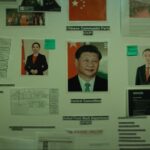
“All our cadres, whatever their rank, are servants of the people, and whatever we do is to serve the people. How then can we be reluctant to discard any of our bad traits?”
—Mao Zedong, “The Tasks for 1945”
Mao also said that “inner-Party criticism is a weapon for strengthening the Party organization and increasing its fighting capacity.” He was, really, a kind of consultant who also just happened to have a hobby of mass murder.
The new Mao
The current dictator of the People’s Republic of China, Xi Jinping, wants to be a kind of Mao, albeit one who is somewhat more selective about his murder victims. Xi prefers to target certain groups, like the Uyghurs and practitioners of Falun Gong, rather than just anybody who might fail to anticipate a Leader’s latest arbitrary impulses.
Otherwise, they’re almost clones. Mao was a reformer, Xi is a reformer. Political corruption and Lucullan indulgence inconsistent with proletarian ideals are among the deficiencies that have not yet been cured, this last despite the party-state’s issuance of a frugality code in 2013 not long after Xi came to power. So further reform is needed.
The dictator and his regulators have been promulgating new “austerity rules” in order to “extend his authority and save money,” thereby killing two birds with one stone. But cadres just won’t listen (“Xi Tightens Leash on Officials’ Boozing and Lavish Living,” WSJ, June 9, 2025).
Local officials gathered in China’s central city of Xinyang in March for a seminar about regulations requiring them to be frugal. Over lunch, five officials consumed four bottles of baijiu, a fiery sorghum-based spirit, flouting the very rules they had studied.
One of them died that afternoon, according to an official account, which didn’t state the cause of death. The officials at the lunch tried to hide the illicit consumption of alcohol, the account said, by paying off the deceased official’s family and omitting the drinking in their reports to superiors….
“The party center has beaten drums and swung hammers, issued orders time and again,” but some officials still “turned a deaf ear and showed no fear or awe,” the Central Commission for Discipline Inspection said in its disclosure on the incident. “For such problems, we must insist on zero tolerance.”
The goal of “zero” gustatory excess at public functions and zero other extravagance seems merely aspirational. It won’t happen unless and until there are zero CCP officials. But Xi isn’t that kind of Mao.
A PR job
Officials involved in the debauchery and death in Xinyang, maybe by sitting at the same table as the official who died, have been punished. In 2024, 313,000 were punished for sundry unfrugal conduct. Nevertheless, Chinese Communist Party officials won’t be turning Amish anytime soon.
The latest austerity agenda also won’t solve such problems as the blanket of debt swaddling everything in China.
“But,” according to Neil Thomas of the Asia Society Policy Institute, the new austerity crackdown “reinforces Xi’s political control over the bureaucracy and burnishes his image as a leader who stands against corruption and excess, especially at a time when many ordinary Chinese are feeling economic pain.” So there’s that.
Also see:
StoptheCCP.org: “China’s Corruption and Anti-corruption Are Forever”












